Communication platform as a service (CPaaS) is a cloud-based solution enabling businesses to directly embed communication features on existing business applications, thus extending the platform’s functionality. These communication capabilities include voice, messaging, email, fax, and video, depending on the provider. In this article, we’ll explore what is CPaaS for, how to choose a software solution, and when to use it.
How CPaaS Works
The key component you must learn about communications platform as a service is the application programming interface (API). This refers to the set of protocols that enable two or more software programs to communicate with each other and transfer data via voice-over-internet-protocol (VoIP) networks.
These APIs are integrated into your website or mobile app, giving the platform the ability to perform communication functionalities, such as sending and receiving a text or making and accepting a call. Some CPaaS tools let you develop communication capabilities with code, minimal code, or no code at all. You have the option to customize through and through, build on the provider’s code samples, or simply copy-paste codes.
If you decide to build with code, CPaaS tools have software development kits (SDKs) and comprehensive documentation to help you write code faster and with fewer mistakes. To summarize how the software solution works, APIs enable capabilities on CPaaS, meaning all the communication features, like short messaging service (SMS) and voice calls, are directed by these software intermediaries.
Top CPaaS Providers at a Glance
Now that you understand what is CPaaS and how it operates, it’s time to be familiar with software vendors in the market. Different providers vary in API offerings and supported programming languages. Some offer 99.999% uptime guarantee (five nines), which translates to only 26 seconds of downtime a month, while others provide less. These features are important considerations for your choice of solution.
Refer to the table below for our top-recommended platforms. Check out our buyer’s guide on the best CPaaS providers to learn about other solutions.
CPaaS Solutions | Key Communication APIs | Estimated Costs | Programming Languages | Uptime Guarantee | More Information |
|---|---|---|---|---|---|
RingCentral MVP: Best for Artificial Intelligence | |||||
Voice, SMS, video, fax, team messaging, webinar, and artificial intelligence | Core: $30 Advanced: $35 | .NET, Java, JavaScript, PHP, Python, Ruby | 99.999% | or | |
Vonage: Best for Communication Security | |||||
Voice, SMS, and multimedia messaging service (MMS), video, social chat, verification, number insight, and Fraud Defender | SMS: $0.0065 to send a message and $0.0060 to receive a message Voice: $0.0042 per minute to make and receive a domestic call | .NET, Java, PHP, Python, Ruby, and Node.js | 99.99% | or | |
8x8: Best for Number Masking | |||||
Voice, SMS, video interaction, number masking, automation, and number lookup | SMS: $0.00938 per message Voice: $0.0024 per minute to make and receive a call | Java, JavaScript, PHP, Python, Ruby, Node.js, and Go | 99.999% | or | |
Twilio: Best for Internet of Things Connectivity | |||||
Voice, SMS, video, chat, notification, and Internet of Things | Voice (local): $0.0140 per minute to make a call and $0.0085 per minute to receive a call SMS (local): $0.0079 to send and receive a message | .NET, Java, PHP, Python, Ruby, and Node.js | 99.95% | or | |
Benefits of CPaaS
Since communication needs vary from one business to another, a one-size-fits-all approach in software solutions doesn’t always apply. This is where communications platform as a service comes in, accommodating businesses with specific requirements for internal and external communications and prefer customizing business apps.
For instance, financial organizations use Verify API to authorize transactions on apps. Healthcare companies use video API to add video chat functionality to telehealth platforms. Below are more benefits you’ll get from using CPaaS:
CPaaS allows you to develop features without building them from scratch, so you save more on labor costs and license purchases. Moreover, it’s hosted in the cloud, so you won’t have to spend money on setting up and maintaining the infrastructure in your office. The best financial perk in choosing CPaaS is the pay-per-use pricing model. Most providers only charge for every successful SMS sent or voice call received.
With CPaaS’ APIs and SDKs, the process of developing capabilities becomes more efficient. There’s even less work involved when you choose the no-code tools available on the platform. The typical timeline of development that stretches to months can be reduced to days, hours, or minutes, even. This means you’re able to use features immediately without much effort on the development team.
About 41% of companies use API solutions from more than one CPaaS vendor, based on a 2023 Metrigy survey. Among these respondents, 55.2% use a low-code platform, with 49.8% saying that this is their primary approach. Meanwhile, 31% primarily use full-code solutions, and 19.4% on no-code.
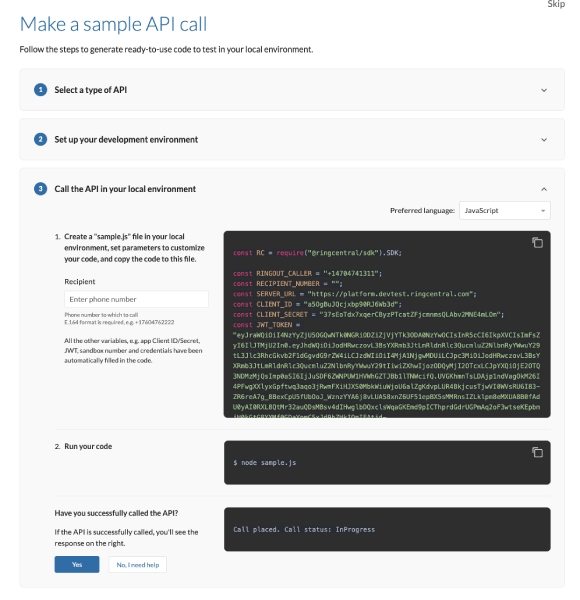
Generate programming codes in a few minutes using RingCentral’s developer platform. (Source: RingCentral)
RingCentral, one of the most popular VoIP phone systems, features a developer platform that allows users to create a sandbox account and follow easy steps for writing codes. The steps involve selecting the type of communication API and setting up the development environment. After this, you’ll be able to see a sample code, key in specific variables, and run it.
In a few minutes, you can integrate voice or SMS capabilities into your existing business app. RingCentral supports different programming languages and lets users set their preferences in the sandbox account.
Given that CPaaS facilitates app customization, it supports scaling communications. Add more capabilities to your business website or app if you need to expand customer outreach and engagement initiatives for seasonal peak periods.
On the flip side, remove APIs when the communication demands die down. Integrate only the capabilities you need for a specific period. With CPaaS’ flexible pay-per-use pricing, you won’t have a problem making quick adjustments.
CPaaS lets you beef up customer communication strategies since different APIs perform various capabilities. For example, the notification API sends order delivery status updates and appointment reminders. Video API helps customers get visual assistance for technical issues. With multiple communication efforts, the business enhances customer experience and increases loyalty.
A 2021 Vonage-commissioned Forrester study showed that 98% of organizations with CPaaS tools deemed themselves “extremely effective” in providing the content customers want and require. On the flip side, only 37% of those not using CPaaS solutions claimed they are effective.
Interestingly, when asked about business challenges, only 30% of companies with CPaaS say they struggle with the lack of visibility into customers’ communication preferences. Meanwhile, an overwhelming 86% of companies without CPaaS said they encountered this difficulty.
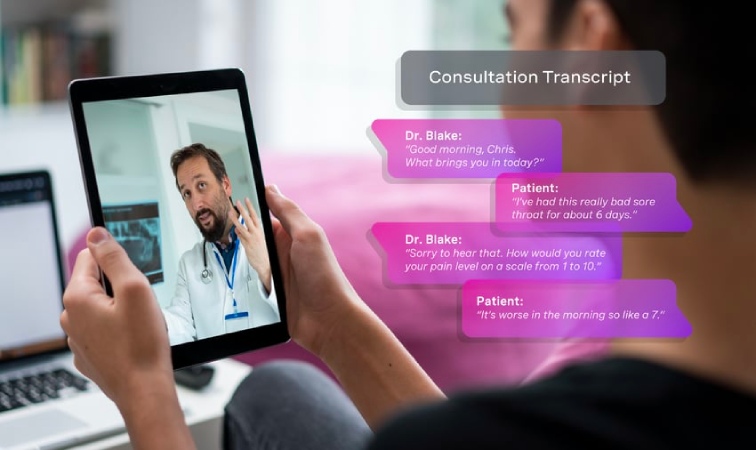
Vonage offers video API and lets users access transcripts after a session. (Source: Vonage)
Vonage allows users to embed interactive videos into web, mobile, and desktop applications. Its Audio Connector sends raw audio streams from live video calls to speech recognition services, such as Google Speech to Text and Azure Speech to Text, facilitating real-time and offline processing of audio files. Users will then be able to access live captioning, transcriptions, or, in healthcare settings, electronic health records (EHR), generated from the video call sessions.
Workflow automation builders form part of CPaaS solutions. With these tools, communication processes become more efficient and require less human intervention, allowing teams to focus more on high-value business initiatives. Some of the things you can automate using CPaaS are sending responses to incoming messages and collecting feedback after every customer interaction.
Features of CPaaS
Faster and easier app development and customization in CPaaS solutions are possible with their robust features. These are the common tools you’ll find on such platforms:
Communication APIs are the backbone of CPaaS systems, enabling different communication capabilities to be embedded into an app or website. Refer to the list below for the common APIs small businesses use:
- Voice API: This typically features calling capabilities you’ll find in business phone systems. They include call routing, call forwarding, call recording, audio conferencing, call reporting, interactive voice response (IVR), and answering machine detection.
- SMS API: Used for automated marketing messages, alerts and notifications, and autoresponders, this API supports message queueing and long message concatenation.
- Messaging API: This covers messaging on the web, social media, and apps. Maximize this to handle order updates and confirmations, product upselling, and customer polls and surveys.
- Verification API: This prompts cross-channel two-factor authentication, account login attempt push notifications, or verification codes.
- Video API: Different providers will have different limits on the number of call or meeting participants. For instance, RingCentral has a cap of 200 users. The API enables access to meetings via browsers through webRTC technology. This removes the need for a downloaded app.
- Email API: Send automated messages, like account creation, shipping notifications, or password recovery, to customers’ email inboxes. Maximize it for marketing efforts, such as monthly newsletters and product recommendations. Create custom triggers to send the right messages to your audience at the right time.
Most CPaaS providers have visual editors that help you build communication features, such as SMS surveys, IVR, and call forwarding, even without technical expertise. These editors have drag-and-drop interfaces, making them easy to use for those without a coding background. Popular CPaaS provider Vonage has this kind of design studio, where you’re able to create IVR systems effortlessly.
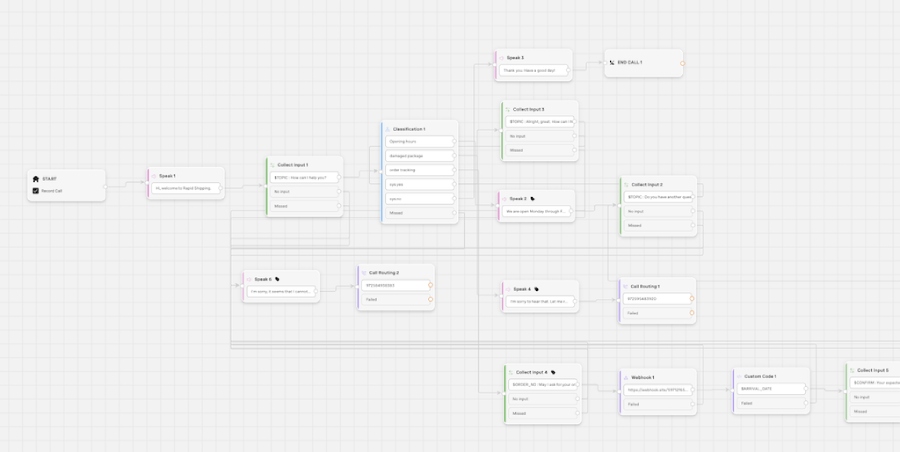
Use Vonage AI studio to create virtual assistants for self-service systems. (Source: Vonage)
Most CPaaS solutions support common programming languages, namely:
- C#
- Go
- Java
- JavaScript
- Node.js
- PHP
- Python
- Ruby
- Unity
To keep track of user interactions, CPaaS solutions provide access to historical and real-time reports. The platforms feature dashboards, where you see what’s happening in each communication channel.
The data presented in these dashboards are organized visually, in graphs, charts, or tables, for easy reference. They provide information that helps businesses evaluate key performance indicators (KPIs).
For voice API, the typical data points are the total number of calls, call duration, and disconnect reason. For messaging, you’ll find the total number of messages, the number of messages sent, and the number of messages received. Draw actionable steps in improving communications with these data points.
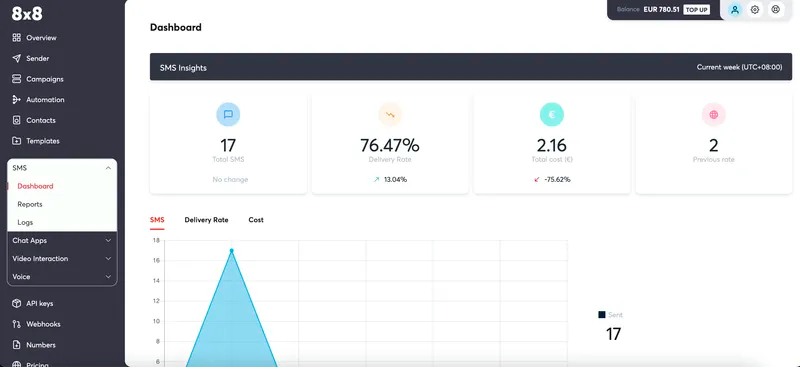
Get meaningful insights about the performance of different communication features on 8×8’s CPaaS dashboard. (Source: 8×8)
8×8’s CPaaS solution features a dashboard where you see figures measuring the performance of communication APIs. The SMS insights, for instance, include the total number of SMS, delivery rate, total cost, and previous rate. Aside from the dashboard, the analytics tool has reports and logs, which give you a more detailed view of communication initiatives.
CPaaS providers offer service level agreements (SLA) stating a certain minimum percentage of uptime. This is a critical consideration for small businesses, especially because you want to provide uninterrupted services for customers.
The gold standard for SLA uptime is 99.999% availability, which translates to just 78 seconds of downtime per quarter. The five nines can weather sudden surges prompted by different factors, including holidays or crises.
CPaaS Use Cases
CPaaS can be used for a wide range of communication needs, depending on the APIs you choose. Below are some of its common applications:
Place & Accept Phone Calls
Voice API lets you manage inbound and outbound calls on your own business platform. With RingCentral’s API, you’re able to direct how incoming calls are distributed throughout the network. Designate business hours as to when your phone system accepts calls and configure call forwarding to send certain calls to a specific extension. Other call routing features include call queues and IVR.
Broadcast Messages
With SMS API, you’ll be able to send transactional messages, such as promo alerts and delivery updates, right from your ecommerce website or app. Aside from helping you get the message across in a timely manner, this functionality lets you do away with the manual task of delivering texts one by one to each of your customers. Many CPaaS solutions enable tracking, giving you the peace of mind that the messages reach the intended recipient.
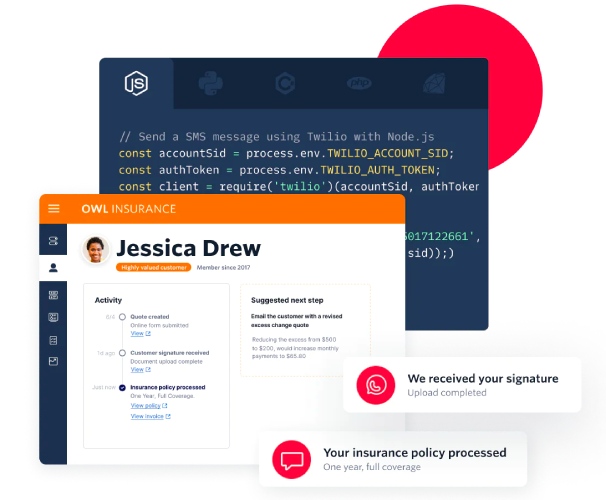
Twilio supports sending and receiving transactional SMS. (Source: Twilio)
Twilio enables users to send texts to 180-plus countries while complying with global regulations. After broadcasting messages, the CPaaS platform offers real-time analytics that let you monitor message delivery and engagement. On top of this, Twilio offers business phone numbers in over 100 countries, supporting your messaging needs. These include local, national, mobile, and toll-free numbers.
Launch Video Meetings
Some platforms, like telehealth apps, benefit from video APIs, allowing patients to virtually meet doctors in real time. End users won’t have to switch to a third-party platform or download apps, but rather simply click the meeting link within the telehealth app to be directed to the digital room. This is especially useful for patients who want comfort and convenience amid their busy schedules.
Frequently Asked Questions (FAQs)
CPaaS allows businesses to use APIs to add communication capabilities to existing applications. Meanwhile, unified communications as a service (UCaaS) integrates communication features, such as voice, messaging, and video, in one single solution. Think of UCaaS as an off-the-shelf solution, while CPaaS as a made-to-order platform.
The main difference between these two solutions is that VoIP supports internet-enabled phone calls only, while CPaaS provides an a la carte menu of various communication features.
No, Microsoft Teams is a team collaboration app, offering instant messaging and video meetings capabilities. However, Microsoft has Azure Communication Services, a CPaaS solution with voice and video calling, chat, SMS, phone numbers, and email APIs.
Bottom Line
According to Sinch, 79% of organizations have rolled out or will adopt conversational customer engagement, the practice of connecting with customers through different platforms without losing the context of the conversation. Of this number, 52% will use a CPaaS solution to implement such a communication strategy.
A CPaaS solution benefits companies that want to customize or build their own business platforms with specific communication features. With a robust platform supporting a wide range of APIs and programming languages, you’ll be able to develop capabilities and scale operations faster and with fewer operational costs. Consider RingCentral and sign up for its 14-day free trial today.